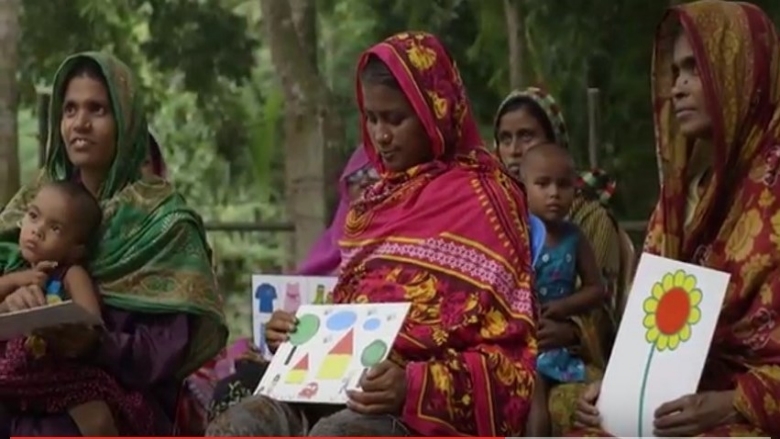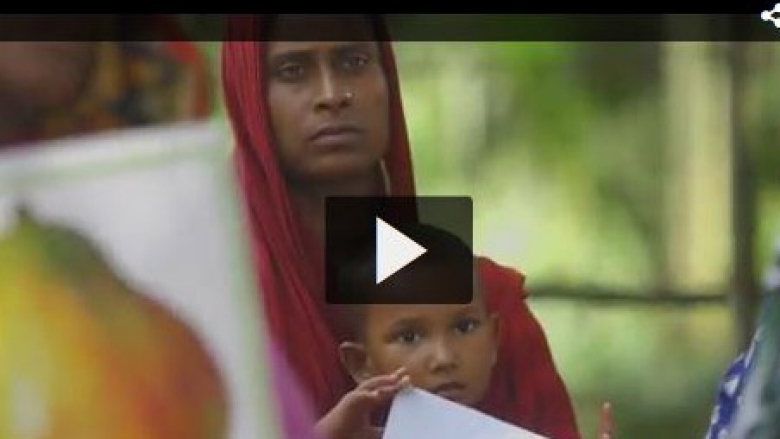Honorable Member of Parliament, Mr. A.K.M. Mustafizur Rahman,
Honorable Secretary, Mr. Abdul Malek,
Distinguished officials and local government leaders,
Members of the media,
Ladies and Gentlemen,
Good morning.
- I am delighted to be present here today at the inauguration event of Jawtno, a groundbreaking program to help the poorest households improve their children's nutrition and cognitive development while supporting mothers through additional income.
- The importance of early childhood development cannot be overstated -- the likelihood of doing well in life as adults is determined early in life. Scientific research shows that the first five years of life is most critical for brain development.
- Evidence also shows that ensuring adequate nutrition prenatally and in the first two years of life helps to maximize a child’s intelligence and brain development. Well-nourished children complete more years of schooling, learn better, and are able to earn higher wages in adulthood.
- Bangladesh’s success in reducing maternal and child mortality, and improving child nutrition has been impressive. Still, Bangladesh is among the 10 countries with the highest prevalence of malnutrition in the world. 36 percent of children below the age of 5 are stunted; the rate of undernourishment tends to be higher in poorer households.
- Investing in initiatives to reduce stunting and improve child nutrition is a key priority for Bangladesh and among the most cost-effective development actions to achieve its vision of middle income status by 2021.
- Realizing the importance of improving child nutrition for the country’s development, World Bank Group president Jim Yong Kim announced up to $1 billion financing to help Bangladesh end stunting during his visit last October.
- The World Bank is helping the country fight stunting and improve child nutrition through Jawtno, and another nationwide program. The Jawtno program will help poorest mothers and pregnant women in 43 upazilas with high poverty and child malnutrition rate. They would learn how to improve the nutrition and brain development of their young children and have additional income to act on that learning.
- About 600,000 pregnant women and mothers of children under the age of five years from poor households will receive quarterly payments through the Bangladesh Post Office for participating in activities aimed at the growth and development of their children.
- International evidence tells us that programs like Jawtno can make a significant contribution towards increasing consumption of nutritious food and improving maternal and child nutrition outcomes. By providing regular income support to poor mothers, based on their use of child growth monitoring, parenting and early stimulation services, Jawtno will help break the cycle of poverty transmitted from generation to generation.
- We are excited that today the young mothers and pregnant women will receive for the first time electronic cash transfers through their Jawtno cards. This not only allows for secure cash payments through digital systems but also eases access to payment for beneficiaries by bringing it closer to their homes. Having their own financial accounts will have a transformational impact on women’s economic empowerment.
- The project will also help strengthen the capacity of Union Parishads, Community Clinics and the Union Post Offices. With better capacity, these local level institutions will ensure better service delivery to the wider local community, and not just project beneficiaries.
- I would like to thank the Honorable Minister for his leadership and support, which has made it possible to launch the Jawtno program today. This is among the country’s first safety net programs to make use of the targeting system being developed by the Bangladesh Bureau of Statistics.
- Honorable Minister, your ministry – the Local Government and Rural Development & Cooperatives plays a leading role in our joint efforts to reduce poverty in Bangladesh. We have an ongoing program of close to $3 billion in 11 projects with your ministry that includes empowering local governments, improving rural connectivity, water supply and disaster risk management, and of course, now we have the Jawtno Program.
- The World Bank was among the first development partners to support Bangladesh following its independence. Since then the World Bank has committed more than $24 billion grants and interest-free credits to Bangladesh.
- In recent years, Bangladesh has been the largest recipient of the World Bank’s interest-free credits. The World Bank also remains Bangladesh’s largest development partner and our financing accounts for 25 to 30 percent of the country’s total external development financing. In the last five years, our support to Bangladesh has nearly doubled. We expect our funding to Bangladesh will continue to increase significantly in the coming years.
- Let me end by congratulating the mothers who would receive the cash cards, and are determined to create a better future for their children, and also the community clinics, the post offices, and the Union Parishads, whose support will be critical to make these mother’s dream into a reality. I wish all the very best to the Jawtno Program and the beneficiary mothers and children.
Thank you!


